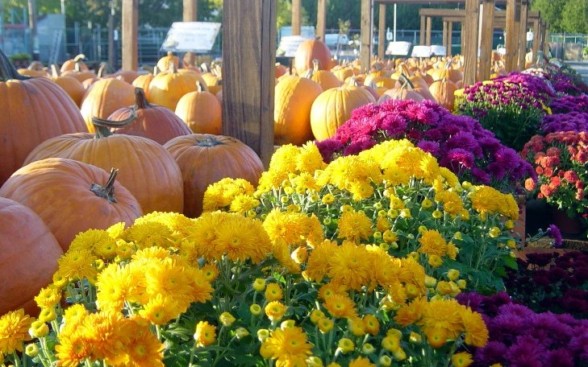캐나다의 위도가 높다보니
겨울도 빨리 다가와서
자연히 추수가 빨라서
미국의 thanksgiving day보다
한달 이상이 빠른
10월의 둘째 월요일로 정해져 있다.
역사적으로 볼때 1578년에 탐험가 프로비셔가 동양으로
가는 길을 찾으려고 현재의 뉴펀드랜드주에
도착해서 오랜 여정에서 살아 남은 것을
감사하면서 드리면서 유래가 된 것으로 전해오고 있다.
한국의 추석과 비슷한 명절로
일년에 한번씩멀리 떨어진 식구와 친척들이 모여서
새로 추수한 곡식들과 야채들로 음식을 만들어서
나누어 먹으면서 신에게 감사드리면 파티를 한다.
참고로 미국과 캐나다에서 일년중 가장 사람의 이동이 많은 날이
바로 추수감사절 주말이다. (비행기와 고속도로)
주로 해 먹는 음식은
main course 로는 구운 turkey or ham
야채로는 으껜 감자나 yam, 구운 squash, 호박,
string green beans, brussels spouts,
그리고 디저트로는 pumpkin pie 나 apple pie, pecan pie를
먹는다.
이 도시에 사는 친척들이 아무도 없어서
매년 서운해 하는 애들때문에
일부러 꼭 가까운 친구들을 초대해서
명절같이 시끌벅적하게 먹고 마시면서 파티를 한다.
매년 누구를 초대할지
그리고 무슨 메뉴를 만들지가 큰 관건인데.
올해는 식구들이 나부터 좀 시큰둥해서
아직도 확실하게 정해진게 아직 없다.
항상 과거 30년 이상을 한해도 거르지 않고
푸짐하게 음식을 장만해서
많을때는 열가족까지 초대를 해서 명절을 보내 봤는데
나이가 들어가는지
꽤가 생기기 시작하기도 하고
계속 퍼주다 보기만 하니 슬슬 약도 오르기 시작한다.
구질구질하게 앞치마를 두르고 부억에서 발이 묶이기 보다는
나도 가끔은 누가 나를 초대를 해 주어서
우아하게 차려입고 손님자격으로 파티에 가고 싶어진다.
이제는 그럴만한 자격이 된 것 같은데........
일주전부터 눈치만 보고 있는데
turkey 두마리가 공짜로 생기는
불상사가(?) 일어나서
올해도 그걸 먹어 치우는 차원에서라도
꼼짝없이 만 이틀을 투자해서 터키를 구워야 할 상황으로
흘러가고 있다. 주위에서 벌써 은근하게 초대 압박
전화가 걸려온다. (디저트는 제공해 줄테니
나머지는 알아서 하라는 물귀신 작전으로 나온다)
아직 며칠 시간을 벌면서
잔머리를 굴려보는데까지 굴려보다가
못 이기는 척 아주 약식으로 때워볼 참이다.
(이건 thanksgiving의 원래 뜻과 취지와는
너무 거리가 멀어서 사실 가슴이 많이 찔린다)
History of Thanksgiving in Canada
The history of Thanksgiving in Canada goes back to an explorer,
Martin Frobisher, who had been trying to find a northern passage to the Orient.
In the year 1578, he held a formal ceremony, in what is now the province of
Newfoundland and Labrador, to give thanks for surviving the long journey.
This feast is considered by many to be the first Thanksgiving celebration
in North America, although celebrating the harvest and giving thanks
for a successful bounty of crops had been a long-standing tradition
throughout North America by various First Nations and Native American groups.
First Nations and Native Americans throughout the Americas,
including the Pueblo, Cherokee, Creek and many others organized harvest
festivals, ceremonial dances, and other celebrations of thanks
for centuries before the arrival of Europeans in North America.
Frobisher was later knighted and had an inlet of the Atlantic Ocean
in northern Canada named after him — Frobisher Bay.
At the same time, French settlers, having crossed the ocean and arrived
in Canada with explorer Samuel de Champlain, also held huge feasts of thanks.
They even formed 'The Order of Good Cheer' and gladly shared their food
with their First Nations neighbours.
After the Seven Years' War ended in 1763 handing over New France
to the British, the citizens of Halifax held a special day of Thanksgiving.
Thanksgiving days were observed beginning in 1799 but did not occur every year.
After the American Revolution, American refugees who remained loyal
to Great Britain moved from the United States and came to Canada. T
hey brought the customs and practices of the American Thanksgiving to Canada.
The first Thanksgiving Day after Canadian Confederation was observed
as a civic holiday on April 5, 1872 to celebrate the recovery of the
Prince of Wales (later King Edward VII) from a serious illness.
Starting in 1879 Thanksgiving Day was observed every year but the date
was proclaimed annually and changed year to year.
The theme of the Thanksgiving holiday also changed year to year
to reflect an important event to be thankful for. In the early years
it was for an abundant harvest and occasionally for a special anniversary.
After World War I, both Armistice Day and Thanksgiving were celebrated on the Monday of the week in which November 11 occurred. Ten years later,
in 1931, the two days became separate holidays, and Armistice Day
was renamed Remembrance Day.
On January 31, 1957, the Canadian Parliament proclaimed:
“A Day of General Thanksgiving to Almighty God for the bountiful harvest
with which Canada has been blessed … to be observed
on the 2nd Monday in October.”
'About me...Helen > 헬렌의 일상에서' 카테고리의 다른 글
| 잘 마무리한 뜨개질 이벤트 (0) | 2008.11.08 |
|---|---|
| 새 미국 대통령으로 당선된 오바마 (Barack Obama) 를 보면서.... (0) | 2008.11.06 |
| 할로윈데이 호박을 만들면서 (0) | 2008.10.27 |
| 부모님, 건강하세요... (0) | 2008.09.23 |
| Richard Eaton Singers (리차드 이튼 합창단) (0) | 2008.09.11 |
| 9월 첫주를 사스카추언 강가를 거닐면서... (0) | 2008.09.10 |





